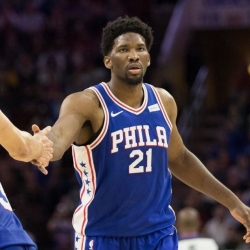The Pennsylvania Gaming Control Board announced that daily fantasy sports (DFS) generated $1.38 million for the state since the launch of licensed DFS sites three months ago. October tax revenues from licensed daily fantasy sports were $435,000, while September generated $320,000.
The jump in November is attributable to two factors. One, the NFL regular season is enterting its playoff chase, so NFL fans are betting more than they did in the first couple of months of the season. Second, the NBA launched into its regular season, so NBA fans are returning to DraftKings and FanDuel.
In the first months of recorded DFS gaming, DraftKings brings in the most revenues for Pennsylvania. FanDuel has the second-best numbers, while Yahoo Fantasy Sports Daily is third.
Less well known operators like SportsHub are a smaller factor. SportsHub is a basketball-only daily fantasy sports site. Its impact is only now being felt, in the first month of NBA basketball.
Preview of Sports Betting
Gaming experts say daily fantasy sports brings in only a small fraction of the revenues traditional sports bets do. During negotiations for the Pennsylvania Gaming Act in 2017, it was assumed that daily fantasy sports would generate $5 million to $10 million a year for Pennsylvania.
The low-end range of those numbers appear to be panning out in practice. If the growth in recent months means $435,000 per month is a reasonable average, then Pennsylvania’s government might pocket $5.22 million per year from DFS gaming.
The same negotiations suggested that online gambling might generate $200 million to $400 million a year for Pennsylvania — with $300 million being a good estimate. Sports betting would generate ten to twenty times what DFS brings in, because the range of bets are more straightforward yet more interesting than daily fantasy sports.
Why Sports Betting Is More Popular
In a DFS contest based on the NBA, an team owner would have to fill out a lineup from a selection of individual NBA players. A salary cap is used, so players like Steph Currey and LeBron James cost more than most NBA starters. The owner cannot build a team purely of NBA All-Stars, but must use resource allocation to optimize their lineup.
That is a complicated process that many gamblers do not want to have to use. Instead, they prefer a point spread on a team-vs-team wager. If they want a truly simple sports bet, they can make a moneyline bet, which dispenses with point spreads and simply has a player wager on which team they think will win.
Live Sports Betting Apps
Of course, live sports betting apps are revolutionizing how sports wagers are made. Instead of a couple of bets on the winner of the game and the over/under, bettors can make dozens of wagers per game. They might wager on who wins the second half, which player scores most in the 3rd Quarter, or who scores the next 3-pointer.
Live bets continue throughout the game, generating a lot of betting action for the sportsbook. DFS contests do not offer such rapid-fire betting, so the revenues generated are smaller.
Hollywood Casino’s Sportsbook
Hollywood Casino launched sports betting on November 17, so numbers are not available yet. In the coming months, other sportsbooks will open in the Pennsylvania gaming market. The quicker they can launch the better, because the NFL generates the most action of any sport in the United States.
Pennsylvania is the 6th largest state in the United States in terms of population. It also charges higher tax rates on gambling than comparable states like Nevada and New Jersey. Of all US states, Pennsylvania generates more in tax revenues than any state but Nevada.
Sportsbooks’ Impact
Sportsbooks have a small margin, so they do not generate a lot of revenue for casinos directly. What they do is bring gamblers into the casino. A sports bettor who is a team fanatic might not care to visit a casino, but the opportunity to wager on their favorite teams or players convinces them to visit the sportsbook.
While there, they might engage in other forms of gambling that have a higher margin. This generates additional revenue for the casino. Sports betting itself is a risk for the casino.
For instance, the recent shootout between the Los Angeles Rams and Kansas City Chiefs had an over/under of 64. That was the largest over/under for an NFL game in 32 years, but the Rams-Chiefs scored a combined 105 points. Because so many NFL bettors assumed the two teams would beat the over/under, Las Vegas Strip sportsbooks took a bath on the game’s wager. William Hill US is thought to have lost a seven figure amount on that one game alone.

